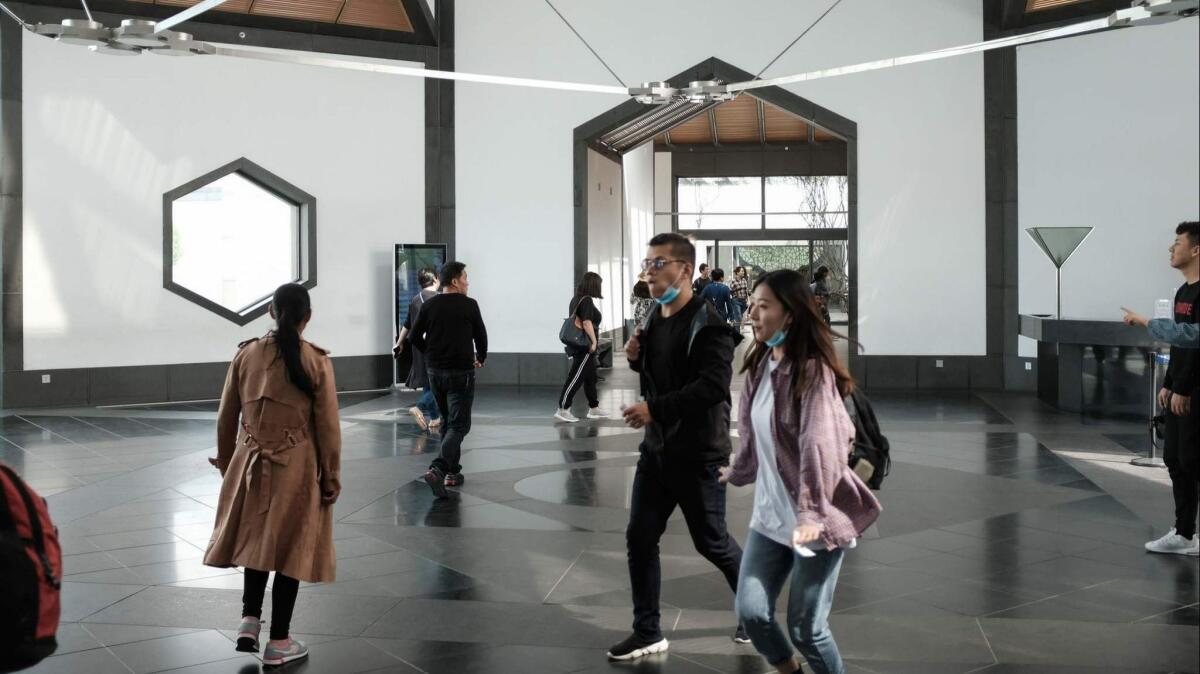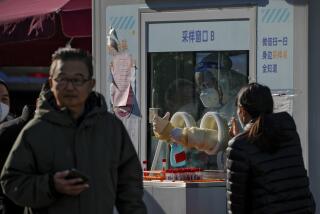China’s trial program to rate citizens on public behavior is a bureaucratic mess

The city of Suzhou, known as “the Venice of the East” for its web of intricate waterways, captured the imagination of Marco Polo when he journeyed through China more than seven centuries ago.
Today it’s drawing attention for another grand project: a sprawling network of databases designed to track the behavior of China’s population. Sitting next to Shanghai with an economy larger than Finland’s, Suzhou was one of a dozen places chosen in 2018 by President Xi Jinping’s government to run a social-credit trial, which can reward or punish citizens for their behavior.
The system, dubbed Osmanthus after the fragrant flower the city uses as an emblem, collects data on nearly two dozen metrics, including marital status, education level and social security payments. Authorities have given it national awards while Western politicians including Vice President Mike Pence have lambasted social credit as ushering in an Orwellian dystopia that could serve as a model for authoritarian regimes around the globe.
But dozens of interviews with the people most affected by the system paint a nuanced picture of the technology in its early stages. Few of the entrepreneurs, volunteers, public servants and other Suzhou residents surveyed said they had even heard of Osmanthus, which is supposed to help shape laws, regulations and standards across China by 2020.
Suzhou’s experience raises questions about the dozens of similar scoring projects that local cities are now rolling out. If residents are unaware of a system designed to change their behavior for the better, then what’s the point of having it? And if it’s struggling to take off in a city lauded by authorities, what are the chances it can be implemented effectively across the nation anytime soon?
“China has an interest in overstating its capacity to collect and analyze data, like they overstate their capacity to monitor with surveillance cameras and facial recognition,” said Jeremy Daum, a senior fellow at the Paul Tsai China Center at Yale Law School. “They want people to believe that misconduct will get caught.”
A three-story brown-and-white building near the city center is the public face of Suzhou’s social credit system. Here individuals can ask questions about their scores.
On a recent Monday afternoon, the building was largely empty. Two staff members shuffled papers and typed at computers, while six seats reserved for visitors were vacant. One woman who entered was lost and asked for directions. The lone self-service machine, emblazoned with logos for Osmanthus and state-owned telecom company China Unicom, was unplugged.
An official in jeans and a T-shirt, who only gave her family name Xi, said about 10 people come in each day. Most are small-business owners who want to verify that they’ve been removed from a financial credit blacklist after paying off a debt. She said she’s hardly ever seen anyone come in to check their social credit score.
People could end up living in fear, worrying that they are being watched all the time.
— Su Su, insurance saleswoman
Proponents of the system say it hews closely to the financial scores pioneered by William Fair and Earl Isaac in the U.S. in the mid-1950s. Today, FICO scores form the basis of the vast majority of loans made to individuals in the U.S. — with occasional debates over how they’re formulated and whether consumers have enough access to them.
But China’s social credit scores arguably go a step further by using the country’s vast surveillance network — public closed-circuit cameras, payment systems and more — to monitor citizens. While good behavior — such as volunteering, paying bills on time or avoiding fines for littering — is supposed to be rewarded with financial perks, bad behavior can abruptly leave residents without access to financing and public services.
Osmanthus collects data on individuals from about 20 government departments, including social security and civil affairs, according to the local administration. Citizens start out with a neutral 100 points and can build up to a maximum of 200 through good behavior. Like many other areas trialing the system, Suzhou hasn’t yet introduced rules to define bad behavior, or the number of points that can be deducted.
But perks for good behavior also are unclear. Lu Wenting, a Suzhou resident who says she does about 24 hours of volunteer work each week, said that she had never heard of Osmanthus, even though it’s supposed to grant public transport benefits to those with high scores. She found out her own score was a healthy “123” after Bloomberg reporters helped her look it up on the WeChat app run by Tencent Holdings Ltd.
About 1 in 8 of the 13 million people monitored in the Suzhou area had a score above 100 as of last August, according to local media reports. Only 4,731 were below 100, all of whom were so-called defaulters who hadn’t paid back loans or had failed to obey court rulings. That leaves more than 11 million people with scores at the baseline.
Still, the idea of punishment is already sparking worries.
A citizen in Yiwu, a city in neighboring Zhejiang province that is also running a trial, said he was denied a bank loan because a traffic cop deducted three points from his score for failing to give way to pedestrians crossing a street. Residents with a score of at least 100 points qualify for “civilization loans” with favorable interest rates.
“People from lower levels of society could break rules without knowing and find their scores lowered and get shut out of more and more opportunities,” said Chen Shicai, a resident in Suzhou, expressing worries that social credit could worsen inequality in a country that already grapples with huge wealth divisions.

One problem is how to integrate social credit into existing legal systems to ensure there are checks and balances to prevent abuse. China’s use of technology and informants among the Uighur minority group in the far western province of Xinjiang suggests that the programs could become more oppressive as they develop.
“I worry that regulations may become too specific, such as parking in the wrong spot,” said Su Su, an insurance saleswoman in Suzhou. “People could end up living in fear, worrying that they are being watched all the time.”
Five provinces or municipalities — Shanghai, Zhejiang, Hebei, Hubei and Shaanxi — have established local credit regulations, but there are no national rules. Zhejiang and Shanghai placed clear restrictions on data collection that exclude personal information on religious beliefs, genetics, fingerprints, blood types and medical history.
“While most of the trials are leaning toward encouraging people with convenience and perks, local authorities need to exercise caution when it comes to punishment,” said Han Jiaping, director of the Credit Research Institute affiliated with the Ministry of Commerce. “Government at all levels shouldn’t over-punish and infringe people’s privacy and legitimate rights.”
Another wrinkle is that many residents see more value in competing systems. At the 105-year-old Suzhou Library, citizens with high Osmanthus scores are supposed to be able to get longer book loan periods. But library staff said most people checked out books using their Zhima Credit number, a private credit score from Alibaba Group’s Ant Financial. Few people even ask about their Osmanthus score.
“It’s more like a vanity project,” said Diao Yun, a Suzhou resident who works for a private company. “There’s no promotion of the system in the city — no billboards, no ads or public campaign as far as I see. It’s distant from people’s daily lives.”
Cities and officials looking to build and implement a social credit system face a bewildering array of official guidelines and documents from the State Council and other central and regional government bodies. Those rules relate to everything from assessing creditworthiness to punishing cultural performances on the internet that have a “heinous” social impact.
In Suzhou, the main roadblock to promoting the system is inter-department squabbling over data sharing and who will pay for perks, according to a report in the state-owned Suzhou Daily. The paper said only 30 of the 70 departments are sending data directly to the platform, with others worried about transferring information without a legal requirement.
Those teething problems mean that many residents in Suzhou are unaware of the system. None of the staff questioned in the subway, parks and museum knew anything about the scoring system or alleged perks, such as priority non-emergency service at hospitals.
Another problem is at the national level. President Xi and his team are engaged in an escalating trade war with the Trump administration that threatens to further hurt growth as companies get caught in the line of fire.
It’s not a priority among China’s top leaders to push through a nationwide social credit scoring system now even if Suzhou and other localities can set up workable models, said Zhang Jian, an associate government professor at Peking University.
“President Xi and his government have been caught up ‘firefighting’ internal and external pressures since last year,” Zhang said. “I doubt the party leaders are willing to expend the time, energy and political capital to roll out the plan.”
More to Read
Inside the business of entertainment
The Wide Shot brings you news, analysis and insights on everything from streaming wars to production — and what it all means for the future.
You may occasionally receive promotional content from the Los Angeles Times.










